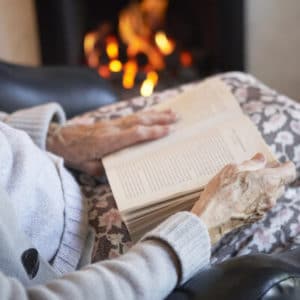
Winter can be a challenge for those that struggle with mobility, or have conditions such as osteoporosis, as the risk of slips and falls increases in icy conditions.
At Helping Hands, we have over 30 years’ experience in caring for older adults and their families. Here are our top tips to help ensure elderly relatives stay safe and well this winter.
Get prepared in advance
Before winter well and truly hits, it’s wise to take a few precautions while it is still easy to get out and about.
Stock up
While possible, it’s a good idea to make sure the cupboards and freezer are stocked with plenty of food for the winter. When it’s too cold or icy to leave the house, consider ordering shopping online to be delivered, to avoid any risk of falls and slips on a visit to the shops.
Order prescriptions
If any repeat prescriptions will be needed over winter, make sure they’re ordered in plenty of time as the bad weather can cause delays. If an elderly friend or relative is susceptible to colds during this season, it’s wise to make sure there’s some cold and flu medicine in the house too, just in case.
Keep the home warm over winter
The cold weather is likely to prevent people from venturing out, so it’s important to make sure home is a cosy, safe place to be.
Monitor the heating
Make sure the house is heated to at least 18°C at all times, but don’t hesitate to turn it up if this still feels too cold.
It’s wise to ensure the heating system is in good working order before the weather gets too bad. To do this, have a qualified professional assess it in advance.
Layer up
As well as keeping an eye on the thermostat, keeping a warm blanket to hand and wearing multiple layers can help keep the heat in. It can be tempting to just wear one large cosy layer, but it’s better for heat retention to wear lots of thinner layers.
Take care
Taking more time for self-care is important throughout the winter.

Eat well
Hearty stews, soups and vitamin-rich meals are good ideas for winter. Not only is eating hot food ideal for keeping the body warm, but having a healthy diet is important to keep colds and flu at bay.
Live well
The winter months can be tougher on mental health. With dark afternoons and freezing weather preventing people from getting out and about, seeing friends and keeping up with regular activities, it’s important to make sure the winter daily routine features a few enjoyable activities.
Whether it’s watching a favourite programme, reading or calling a friend on the phone, make sure there’s purpose to each day.
Signs of hypothermia to look out for
When an elderly person is too cold for too long, they become more at risk of a heart attack, a stroke, or developing the flu, as well as other conditions such as hyperthermia. Hyperthermia is a dangerous condition that requires emergency assistance, and the initial symptoms may include:
- Pale, cold skin
- Shivering
- Feeling tired
- Showing signs of confusion
- Speech becoming slurred
- Rapid breathing
If you or someone you know shows signs of hyperthermia, it’s essential they receive medical attention immediately.
Sources
http://www.nhs.uk/Livewell/winterhealth/Pages/KeepWarmKeepWell.aspx
http://www.ageuk.org.uk/health-wellbeing/keeping-your-body-healthy/winter-wrapped-up/staying-healthy/
http://www.nhs.uk/Conditions/Hypothermia/Pages/Introduction.aspx
